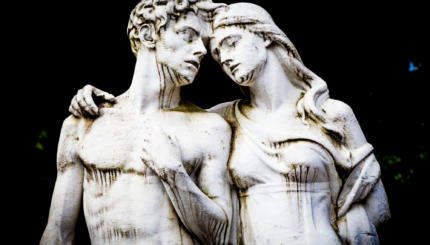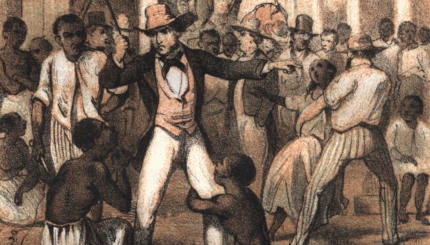The call rang around the world: Gold in California! Of the 300,000 fortune-seekers who flocked to America’s West Coast, at least 4,000 were Jews. The majority hailed from Prussia and other German-speaking lands, though others came from France, Spain, England, Poland, and America’s East Coast. These Jews proved crucial to the establishment of American civilization in the Far West.
Levi Strauss and the Capitalists
Unlike other forty-niners (a reference to 1849, the year the Gold Rush peaked), most Jews in the Gold Rush avoided the down-and-dirty work of mining. They typically were single men who wanted to take their chances with the alleged riches California promised, but they also wanted economic stability and the possibility of family growth in the future. Miners moved from town to town chasing gold discoveries; their intransient work was hardly family-friendly.
So the Jews who went west, many of whom were already trained in business, became prodigious commercialists. They seized the opportunity to establish reliable lines of supply to meet miners’ demands for boots, clothing, hats, and equipment. Some Jews worked as prospectors or engineers in mines, but most started supply businesses.
Levi Strauss was the most famous German Jewish entrepreneur to exploit Gold Rush fever. Born in Bavaria in 1829, Strauss immigrated to New York City in 1847 to help run his two older brothers’ dry goods business there. In 1853, he journeyed to California via the notorious Panama route. He sailed to the Isthmus of Panama (decades before its canal was opened), disembarked, and journeyed via mule and canoe through 60 miles of malarial swampland. At Panama’s Pacific coast, he boarded a ship for San Francisco–the city that had become the hub of the Gold Rush.
Strauss opened up a dry goods shop in San Francisco as a West Coast branch of his family’s New York business. He traveled California selling clothing to miners. Strauss later recognized a need for strong pants that could withstand the abuse of miners’ work. In 1872, he and his partner Jacob Davis patented Levi’s denim pants–a revolutionary and unprecedented garment. Although by that time the Gold Rush had ended, there remained a strong market for miners’ equipment.
Democracy
As Jews like Strauss gained prominence in California’s commercial community, they started to exercise their influence. Jews put together chambers of commerce, worked to broaden local public education, advocated for publicly funded railroads, and pushed the government for federal subsidies to advance their towns’ civic plans. Though they were a small minority in California’s population, Jews contributed significantly to the civic growth that led California to become an official American state in 1850.
One of the most civically-minded Jews to come to California in the Gold Rush was Adolph Heinrich Joseph Sutro, who was born in German Belgium in 1830. He immigrated to California in 1850, and became famous for building an innovative mining tunnel that provided better ventilation and drainage for miners. He was also a real estate investor who once owned a twelfth of San Francisco’s acreage. These achievements contributed to his election as San Francisco’s mayor in 1894.
Jewish Life
Most of the Jews who moved to California in the Gold Rush were single, young, entrepreneurial men, and they cherished the company of other Jews. As they set up dry goods supply businesses, they also founded Jewish fraternal clubs in far-flung mining towns and in San Francisco. Usually a few years after they settled in California, their siblings and parents overseas joined them in immigrating to the American West Coast.
The new California Jews built a substantive society that looked after its own, religiously and socially. They started kosher bakeries and founded boarding houses that served kosher meals. They also established synagogues, religious schools, relief organizations like the Hebrew Benevolent Society, and newspapers.
In 1856 Rabbi Julius Eckmann of Temple Emanu-El, San Francisco’s first synagogue, published a letter in Allgemeine Zeitung des Judentums, a Jewish weekly in Germany. “[T]he lure of gold,” he wrote, “which brought people from all lands in 1849, also brought with it a number of Abraham’s progeny, who have in the meantime expanded their population to such an extent that there is no town in California where not a few of our brothers are settled…[T]he number of them in San Francisco alone is probably around seven thousand.”
Despite communal cohesion and growing numbers, the Jewish transplants were not adamant about religious observance. Rabbi Eckmann chided that “[a] massive indifference rules almost everywhere here. Usually, the first step toward religious life begins with death.” Of course, Rabbi Eckmann spoke sardonically, but his concern was based in reality.
Indeed, the Gold Rush Jews were well integrated–some might say assimilated–among their non-Jewish neighbors. However, they did experience a few anti-Semitic incidents. In 1854, Santa Cruz County Congressman William Stow alleged that Jews would “leave the country as soon as they have money,” and suggested a “Jew-tax” as punishment.
The Jews fought back. They published a rebuttal in a newspaper, lambasting Stow’s “religious persecution,” and lamenting that “a Jew-tax, such as in the dark ages, was suggested in the halls of the law-makers of California.” Though Stow’s Jew-tax idea did not receive serious attention, his prejudice nonetheless disturbed California’s Jews.
Persistence
California’s first Jews displayed remarkable resilience. The boom following 1849 didn’t allow for proper streets to be surveyed or buildings built of masonry. Fires frequently swept through the extemporaneous settlements, swallowing up businesses housed in wooden shanties. But, like their neighboring non-Jewish businessmen, the Gold Rush Jews persisted; they rebuilt their stores, restocked, and tried again.
Though the majority of California’s Jews no longer trace their lineage to the Jews who came in the Gold Rush, it was this group of adventurers who first established a strong Jewish community in the American West. The Gold Rush came and went. But the Jewish community stayed.
kosher
Pronounced: KOH-sher, Origin: Hebrew, adhering to kashrut, the traditional Jewish dietary laws.


